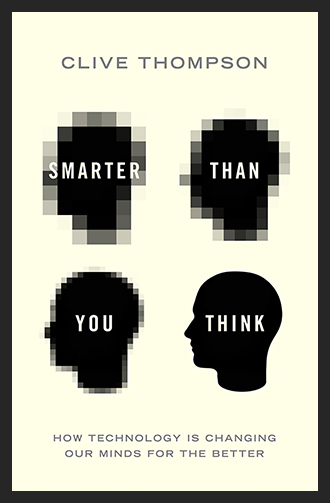Thinking about how the media affect us and the world around us has been something of a Canadian specialty. Harold Innis taught us about “the bias of communication” and Marshall McLuhan declared that “the medium was the message.” Now we have another Canadian, Clive Thompson, a technology writer living in Brooklyn who was once the editor of This magazine, with a most informative and thoughtful book — Smarter Than You Think: How Technology is Changing Our Minds for the Better. It pulls together a considerable literature on what today’s digital tools seem to be doing to us. For those of us who spent most of our lives in a pre-Internet world, just learning about how many tools there are is an education.
The title, perhaps chosen by the publisher, is admittedly off-putting. We all know — and so does Thompson — that technology enables us to do things we otherwise can’t do, and you can call that being “smarter” if you want, and even quantify it as we do with IQ tests, which do show us getting smarter. But cleverness has its limits: technology may or may not make us wiser, which we can’t measure but know it when we see it.
Thompson’s message is essentially practical and optimistic. A computer can beat a chess master but a chess master with a computer can beat a computer. In Thompson’s words: “We’re all playing advanced chess these days. We just haven’t learned to appreciate it.” “What is happening,” he says, “is deeply positive.”
What I most like about this book is how it sets one thinking about what is happening to that ancient medium of writing, how it is being impacted by the new media. Writing has never been so pervasive. We use phones not to talk but to text and tweet, which seems counter-intuitive. Who foresaw that? It’s all about dialogue and conversation in a manner usually associated with oral society. We live in the golden age of TV drama where writers, I’m told, matter more than they do for movies. You don’t need publishers to post on Facebook or blog.
In fact, of course, the problem is not too little writing but too much, an incredible mind-boggling explosion of writing which requires powerful search engines to manage access. In today’s so-called post-literate society we’ve never been so literate. Nor so creative, since it is writing, not reading, that qualifies. Add all of this up and it could be the biggest thing to happen to writing since the Gutenberg press – and we all sense, from Innis and McLuhan, and the American scholar Benedict Anderson, how it nudged the world towards nations and nationalism, Protestantism, and the scientific method. We may indeed live in interesting times.
What, for instance, is happening to memory, individual and collective, which is so central to our identities? The short answer is: a lot. The burgeoning array of digital tools now includes lifelogging – which is new to me – the ultimate selfie of a 24/7 record of what one is doing, at the same time that there have been dramatic decreases in the cost of storage. We are in the world of what Thompson calls “infinite memory.” Thompson’s message is essentially that this will sort itself out as we find what’s worthwhile and what isn’t. So be it, but at what point could the flood of everything become a tsumani that leaves us with nothing? And what happens as technology continues to change radically should we discover we’ve lost the keys to the quickly obsolete technologies of the past?
There is much discussion these days about the consequences of multimedia for multitasking — like texting while driving, which can be fatal — and hence on concentration and contemplation, on attentiveness and mindfulness. Thompson shares that concern and, amongst other things, thinks digital Sabbaths would be a good thing. He also worries that the bombardment of the present may – apparently notwithstanding all that stored memory – make us even more present-minded, uninterested in taking the long looks backwards and forward, than we already are. Yet those contemplative “looks” may be the essence of that elusive wisdom.
Let me end on some good news. Contrary to the view that the social media are politically polarizing, Thompson agrees with those who think they are feminizing culture – causing even alpha males to “like” on Facebook and send birthday greetings like they never have before.
Thompson’s focus in this book is on behaviour as understood by psychologists. It doesn’t tell us how all this information is being used, and misused, by corporations and politicians and the military, of how the media are affecting their behaviour. It would be good if he would do another book, or books, on that. Meanwhile, I recommend this book most highly.
P.S. Just back from seeing Her, starring the disembodied voice of Scarlett Johansson. An enchanting Spike Jonze movie with the happiest of endings about how a technology coming any time now will make us more lovable. Oscar nomination for Best Picture but none for Scarlett Johansson nor Clive Thompson.




